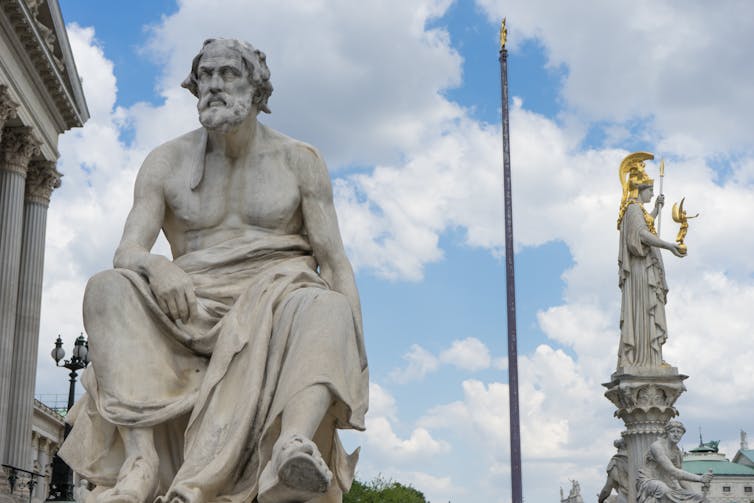It's a turbulent world. Stop stressing and adapt
- Written by Alasdair S. Roberts, Director, School of Public Policy, University of Massachusetts Amherst
The American people have been roughed up over the last decade. A sense of vulnerability and danger tinges their view of public affairs.
The 2008 crash made them wary of markets. The last two years exposed the weakness of political institutions. And international politics has turned ugly.
The main question in politics today is how to deal with this fragility.
Some people are escapists, engaged in a futile effort to make fragility go away.
And some are realists. They accept fragility as an unavoidable aspect of political and social life. They see an open society as the only way to manage fragility well.
Some political scientists will say that I am misusing the concept of realism. In their view[1], realism is strictly about foreign affairs, and realists are people who see global politics as a brawl among power-hungry countries.
These academics identify the ancient scholar Thucydides as a father of realism. Thucydides wrote a history of the war[2] between Sparta and Athens in the fifth century B.C. – a ruthless decades-long struggle for survival. One scholar says that Thucydides wanted to reveal the “unalterable nature[3]” of international relations.
Order is fragile
But Thucydides did more than this. He described an idea that dominated politics within the Greek city-states: that political and social order is fragile.
Thucydides gives us a history of worried peoples. They know that they live in a world suffused with perils.
In the epoch described by Thucydides, the main peril confronting Greek city-states was posed by other states. But people had other worries too. In some places, people lived in “constant fear” of revolution and lawlessness. Elsewhere, they feared drought, famine and disease. Some felt an “undefined fear of the unknown future.”
These were Thucydides’ realists – people who understood that the world was a turbulent and dangerous place.
 Thucydides described a turbulent and dangerous world.
Shutterstock
Thucydides described a turbulent and dangerous world.
Shutterstock
Concern about fragility was shared by later writers in the realist tradition. Machiavelli feared that Florence would be attacked by other city-states but also fretted about unrest within its own walls[4]. The French jurist Jean Bodin[5] also fixated on internal disorders as well as external enemies. The English statesman Francis Bacon offered a list of conditions – including inequality, religious disputes and immigration – that could produce “tempests” within the state[6]. A good leader, Bacon said, looked for signs of coming storms.
Early American leaders were realists too. They were not just worried about threats from Europe. They agonized about “domestic factions”[7] and the “vicissitudes of trade[8]” as well.
And they worried about the future.
“To say that there is no danger,” a Maine newspaper editor warned as he appraised the country’s prospects in 1824, “would betray a gross ignorance of the history of nations.”
The feeling of fragility has oscillated throughout American history. In the 20th century, the mood has shifted many times[9] – from confidence in the 1920s to anxiety in the 1930s, to confidence in the 1950s and anxiety in the 1970s.
 In 2000, President Bill Clinton told the nation all was well.
Reuters file photo
In 2000, President Bill Clinton told the nation all was well.
Reuters file photo
By 2000, the country was confident again. President Bill Clinton boasted that it had never enjoyed “so much prosperity and social progress with so little internal crisis and so few external threats.”[10]
So much for that. Since 2000, Americans have faced terrorist attacks, wars and threats of war, frayed alliances, market busts, technological and climatic shocks, protests and polarization.
Polls[11] show that Americans are stressed by uncertainty about the nation’s future. Pundits have encouraged despair, speculating about the end of democracy[12] and even the end of the West[13].
This is hyperbole. Our times are difficult but not unusual. History shows that fragility is the norm. What is unusual are moments of calm in which politicians like Clinton succumb to complacency.
Realist credo: Adapt in the face of change
The central question today is how Americans should deal with fragility.
One response is isolationism. This is the politics of gated communities and Fortress America. The theory is that the country can separate itself from foreign perils.
More often, though, retreat allows those perils to fester. And it forgets the warning of classical writers: There are dangers within city walls, too.
Another response, aimed at internal perils, is authoritarianism. The search is for a strong leader who can purge society of threats and uncertainties.
But the sorry record of state planning[14] shows the folly of this. Society is too complex to be completely disciplined. And big government has its own internal weaknesses. Societal fragility is simply replaced by state fragility.
A more constructive response is to recognize that fragility cannot be avoided. As Machiavelli said[15], fortune cannot be entirely tamed. The key to survival is adaptability in the face of change. This is the realist credo.
Adaptable societies have three capabilities. First, they are vigilant for dangers. Second, they are open to new ideas. And third, they are ready to abandon outmoded practices and experiment with new ones.
Adaptable societies reject both authoritarianism and isolationism. They prize openness, not just because it promotes freedom, but also because it improves resilience.
The philosopher John Dewey[16] articulated this idea almost a century ago. The state, he said, must be remade constantly to deal with changing conditions. This can only be done through patience, dialogue and experimentation.
John Dewey was a realist too. He was concerned with survival in a turbulent world. His prescription still works today.
References
- ^ In their view (plato.stanford.edu)
- ^ history of the war (classics.mit.edu)
- ^ unalterable nature (www.jstor.org)
- ^ unrest within its own walls (www.gutenberg.org)
- ^ Jean Bodin (plato.stanford.edu)
- ^ “tempests” within the state (www.literaturepage.com)
- ^ “domestic factions” (avalon.law.yale.edu)
- ^ vicissitudes of trade (books.google.com)
- ^ the mood has shifted many times (global.oup.com)
- ^ “so much prosperity and social progress with so little internal crisis and so few external threats.” (www.presidency.ucsb.edu)
- ^ Polls (www.washingtonpost.com)
- ^ the end of democracy (www.lrb.co.uk)
- ^ the end of the West (www.independent.co.uk)
- ^ sorry record of state planning (yalebooks.yale.edu)
- ^ As Machiavelli said (www.gutenberg.org)
- ^ The philosopher John Dewey (www.ohioswallow.com)
Authors: Alasdair S. Roberts, Director, School of Public Policy, University of Massachusetts Amherst
Read more http://theconversation.com/its-a-turbulent-world-stop-stressing-and-adapt-92632

